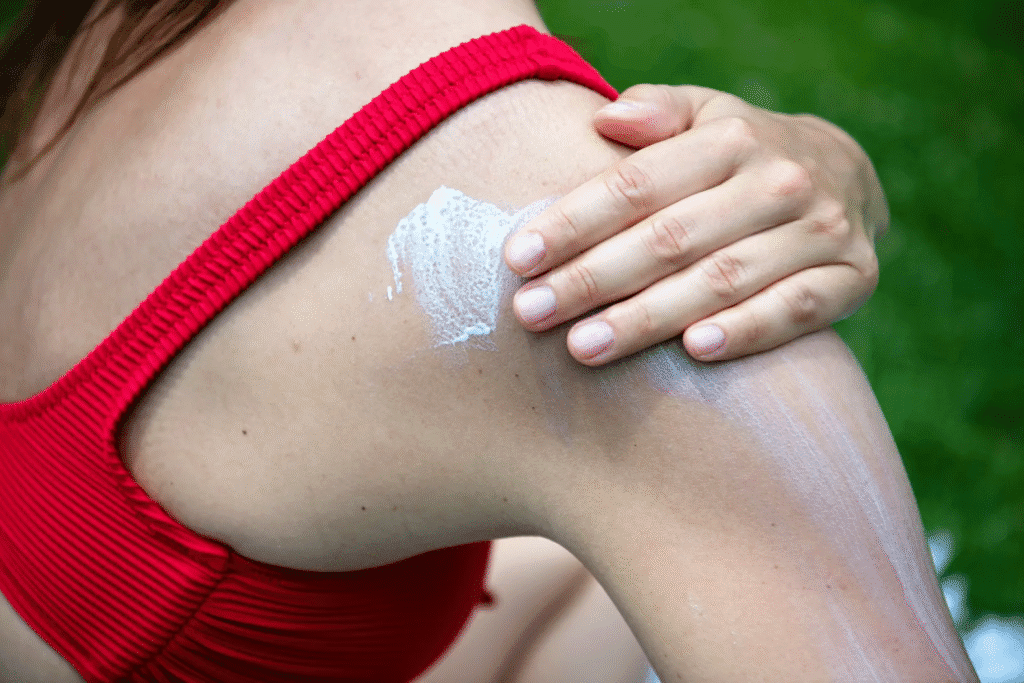At By Sarah, we care deeply about nurturing stressed and sensitive skin—naturally, openly, and always with empathy. That’s why we believe so strongly in standing up against an alarming trend that’s been growing in popularity over the past few years: the anti-SPF movement.
Spurred on by misinformation, this trend argues that sunscreen is not needed—or even harmful. But as a brand committed to safeguarding and renewing skin, we know firsthand how hurtful this message can be. Let’s examine more closely why daily sun protection is important, and how these myths regarding SPF can jeopardize health and lives.
The Truth: Why Daily SPF Matters

Wearing sunscreen daily is one of the easiest, most effective ways you can shield your skin from premature aging. Exposure to sunlight doesn’t create a little bit of redness across your face here and there—it accumulates over the years, harming the DNA in your skin, causing hyperpigmentation, breaking down elasticity, and seriously escalating the threat of skin cancer.
A good SPF should provide broad-spectrum protection—protection for both UVA and UVB rays—and preferably have an SPF of at least 30 with a PA++++ rating.
It doesn’t matter which you opt for, mineral or chemical filters—both can be safe and effective. Chemical UV filters absorb UV radiation, but mineral filters such as zinc oxide and titanium dioxide absorb the majority of UV as well as reflect and scatter around 5% of it.
Consistency is what truly matters. The best SPF available is the one you’ll actually wear—every day.
The Reality: Why Sun Protection Is Non-Negotiable
Sunlight definitely has its rightful position in our lives—making us feel more cheerful and aiding in vitamin D synthesis—but unshielded exposure can be severely harmful. Ultraviolet (UV) radiation is responsible for the majority of skin cancers, such as melanoma. Melanoma, actually, has become the fifth most prevalent cancer in the UK, and it’s estimated to cover more than 19,500 individuals this year alone.
Applying sunscreen daily is one of the simplest and most effective measures to protect against:
Sunburn, which harms the DNA in skin cells
Premature ageing, such as fine lines, wrinkles, and dark spots
Skin cancers, particularly melanoma
The NHS advises using a broad-spectrum sunscreen with at least SPF 30, applying it liberally, and reapplying every two hours—particularly after swimming or perspiring.
Myths vs. Facts: Setting the Record Straight
It’s simple to get bewildered with so many different tips online. Here are three myths we commonly hear—and the truth about them:
Myth 1: “Sunscreen blocks vitamin D.”
Fact: Sunscreen can do a little bit to cut down on vitamin D production, but the impact is small. You’ll get loads of incidental sunlight (like walking to your car or hanging out the washing). You can also get vitamin D from your diet or supplement if necessary.
Myth 2: “Sunscreen is toxic.”
Fact: All sunscreens available for sale in the UK are required to undergo rigorous safety testing and comply with strict regulatory requirements. The assertion that sunscreen itself is somehow dangerous just isn’t true—and perpetuating that myth is risky.
If you have sensitive skin, seek out well-formulated ones. For instance, our Serene Daily SPF 50+ employs advanced, biodegradable UV filters and is dermatologically tested for sensitive skin, such as eczema, rosacea, and dermatitis. In clinical trials, it was given the highest grade for skin compatibility.
Myth 3: “People with darker skin don’t need SPF.”
Fact: Although melanin does offer some natural protection, it’s not enough to block sun damage or skin cancer. All skin tones are susceptible to UV rays—and all stand to gain from daily protection.
If you prefer sound, science-based information, we suggest that you turn to the Cosmetic, Toiletry and Perfumery Association (CTPA) and the Scientific Committee on Consumer Safety (SCCS).
A Look at the Numbers: Why This Matters
Although sun safety is better known, there are still habits to catch up with it. In a British Skin Foundation survey of 2024, it revealed that more than half of Brits (51%) had sunburned themselves accidentally, even though 81% recognized the need for sunscreen.
Only five sunburns in a lifetime can double your melanoma risk. And even a single blistering sunburn during childhood can increase your lifetime risk of developing skin cancer.
And don’t forget: UV can travel through cloud, and melanin only protects partially against UV damage. That’s why sun protection isn’t a holiday treat—your skin needs it every day.
A Personal Story: Hannah’s Wake-Up Call
Hannah Lowery, aged 32 and from Redcar in Yorkshire, once thought of sunscreen as only for summer holidays. As an adolescent, she’d frequently forgo SPF on the UK’s less harsh summers—and wound up sunburned most of the time.
In July 2024, she saw that two moles on her neck had altered shape. Her GP sent her in urgently, and she was diagnosed with melanoma. Thankfully, the cancer hadn’t spread, and both moles were excised.
That experience turned her life around. Today, Hannah promotes everyday sunscreen, regular skin scans, and spreading the word—particularly to young parents. As she says, “It’s really not worth it for a tan.”
Her tale is a strong reminder: sun protection is vital, regardless of how old you are or the weather.
Daily Protection: Easy, Common Sense, Necessity
We at By Sarah think skincare must be calming, rejuvenating, and protective. Here’s the way to make SPF a part of your daily routine:
Your SPF Checklist:
Pick broad-spectrum protection against UVA (aging) and UVB (burning).
- Go for SPF 50 or more for everyday use.
- Apply generously—a teaspoon for your face and neck, and about two tablespoons for your body.
- Reapply every two hours when outdoors.
- Wear protective clothing, hats, and sunglasses.
- Seek shade during peak sun hours (11 am–3 pm).
Let’s Make Sun Safety Second Nature
We get the apprehension about some sunscreen ingredients, particularly if you have sensitive skin. That’s why we took more than two years creating Serene Daily SPF 50+—bringing together established science with a healthy regard for sensitive skin requirements.
It’s been extensively tested by third-party labs, dermatologically tested, and made without ubiquitous irritants or fragrance. So you can apply it with confidence, knowing it won’t irritate and works wonderfully.
At By Sarah, science and sensitivity walk together. We don’t only love your skin—behind the scenes, we work diligently to safeguard it with formulas as gentle as they are potent.
By making daily SPF a routine, you’re not only shielding your skin—you’re keeping your wellbeing, your story, and your future safe.
Also Read : 4 Homemade Toners for Glass Skin — For Less Than €1



